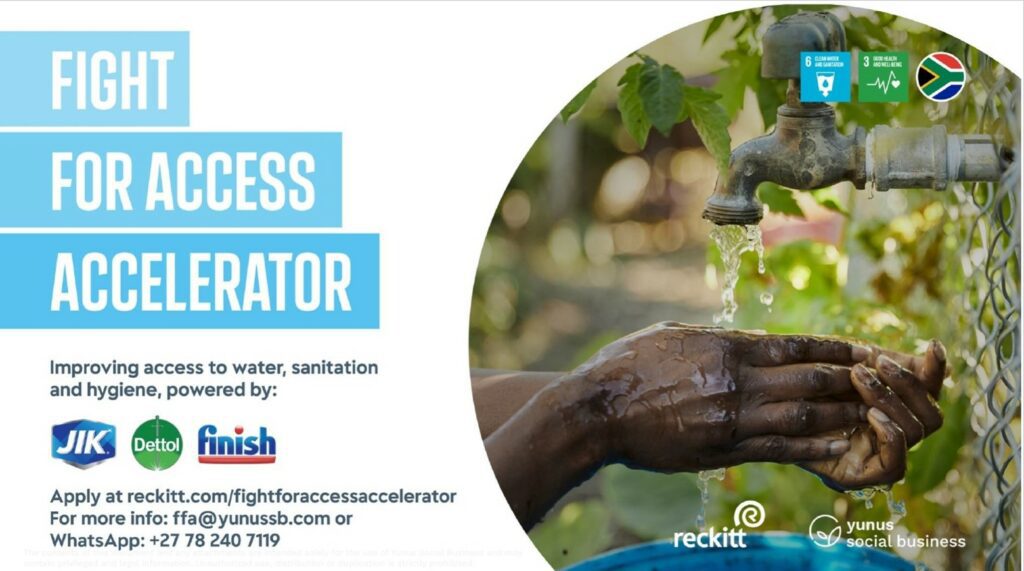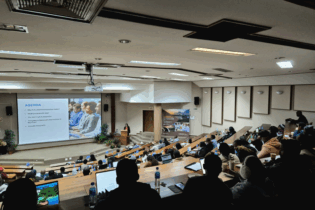Six South African entrepreneurs have been rewarded with grant funding of R300 000 each for their efforts to initiate businesses to create large-scale impact in South Africa’s water, sanitation and hygiene sector (WASH).
As part of the Reckitt Fight for Access Accelerator, the businesses completed a six-month journey with the global healthcare provider and were rewarded for actively creating grassroots solutions for the benefit of local communities. The grant funding will be used to support the social businesses to continue to grow. By helping these social businesses, Reckitt is making a long-term investment into the WASH sector, both in South Africa and Brazil, to drive positive health outcomes, encourage innovative systems, create jobs and economic empowerment. The Fight for Access Accelerator in South Africa was designed and delivered by Yunus Social Business (YSB). “The lives of thousands of people each year are compromised due to cholera, a water-borne bacterial illness that can cause diarrhoea and vomiting due to exposure to and drinking of contaminated water,” says YSB CEO, Jana Lessenich. “Last year alone, nearly 75,000 cholera cases were reported worldwide. Prevention should be simple with better access to water, sanitation and hygiene, which is a universal human right. This programme is enabling solutions in this field from the ground up.” The six organisations rewarded with funding are:- Pennine Energy Innovation – a provider of rapid community sanitation at a fraction of the usual cost. They do so by assisting portable sanitation providers (PSPs) serving peri-urban informal dwellers.
- Rhiza Babuyile – an organisation with a focus on improving water, sanitation and hygiene in the early childhood development schools/nurseries (ECD Centres) and the community.
- Kusini Water – a social enterprise that builds water treatment systems from nanotechnology and macadamia nut shells. Their systems bring clean, safe drinking water to people in rural, peri-urban and informal settlements throughout the African continent.
- LiquidGold Africa – a proudly South African business that equips both public and private organizations with unique dry sanitation solutions that improve end-user hygiene and further drive circular innovation by converting the toilet resource urine into a high-value dry fertilizer.
- Loo Afrique – a manufacturer of innovative water and sanitation technology products, with an aim to improve hygiene, save water & incorporate grey water usage in everyday living.
- ECOBA – a decentralized water hygiene convenience solution for people in water-stressed areas. They offer innovative WASH solutions for special events, emergency situations, and everyday use.
YSB has leveraged its decade-long experience and deep understanding of both the corporate sector and social businesses in the global south to design the Fight for Access Accelerator. The accelerator offers two-way value which secures the sustainability of the program’s impact – growth and scaling support for the social businesses, social innovation and employee engagement for Reckitt.
Rori Mpete, Founder of the social business Loo Afrique and one of the participants of the Fight for Access Accelerator said, “The program has really allowed me to be vulnerable, open and honest about the position of Loo Afrique and the future we are developing for the company. We learnt a lot on the importance of strategy development, implementation, and constant strategy review. The class of financing was a huge eye opener, as it made us realise, we have to be selective in the type of finance we seek going ahead, especially as impact-driven social businesses. There are so many insights that I take from being part of the Fight for Access accelerator program. I thank you all that have made such a program possible for us, as WASH Entrepreneurs.” Deroosha Naidoo, Senior R&D Quality Associate from Reckitt who was a Lead Mentor in the Fight for Access Accelerator Program said, “I’ve really enjoyed the accelerator. From the philanthropic standpoint, it fills my heart with joy to know that people are working hard at changing the world. And for Reckitt to be involved makes me a happier employee.” With South Africa’s WASH sector facing high and complex barriers to improving access to water, hygiene and sanitation, there was a natural affiliation for YSB. The critical lack of skills and resources, with up to 50% of water sanitation areas having limited technical staff; a lack of education – more than a third of the population not practising regular handwashing; and finally, a funding gap estimated at 33.3 billion ZAR annually for water and sanitation services. “Given the size and complexity of these challenges, no one organisation can solve them alone,” says Lessenich. “Through YSB’s partnership with Reckitt for the launch of the Fight for Access Accelerator, we are able to catalyse access to WASH through collaboration across three key stakeholders – innovative social businesses, experienced industry experts, and purpose-driven Reckitt colleagues.” On its pilot run, the six-month journey enabled the chosen grassroots social businesses to accelerate their growth towards creating better access to the current WASH model, innovating and decentralising solutions, and enabling behaviour change and community engagement. The accelerator offered peer-engagement, an expanded network of brand leads and industry experts, and valuable mentorship in areas such as finance, investor readiness, and impact measurement and management. “The world’s biggest problems – including those in the WASH sector – are complex; no one actor can solve them alone. Through its partnership with YSB, Reckitt has taken an important step on the path toward connecting social businesses to corporations. This connection is essential: through accelerators like Fight for Access, corporations have a means to increase their impact in a way that is closely aligned to their strategies, and social businesses are supported on their path to scaling,” Lessenich concludes.







